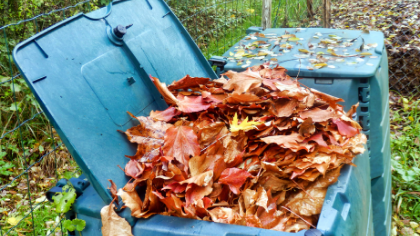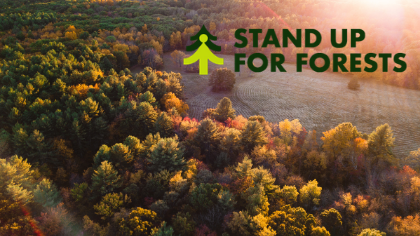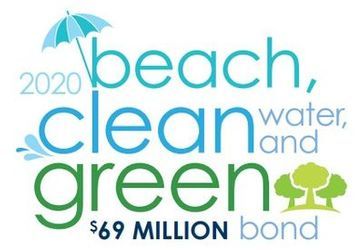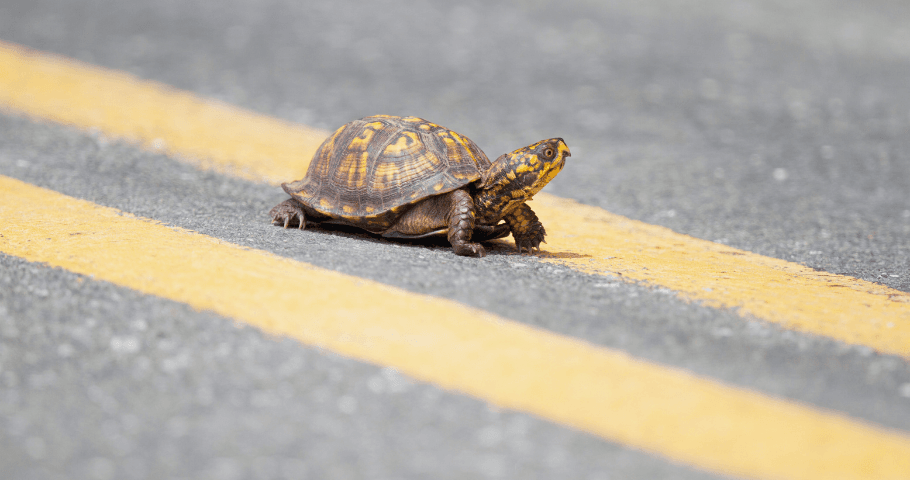
October 2020
The monthly Audubon Eagle Eye Advocacy Updates will provide you with simple actions you can take to help foster a cleaner, healthier planet along with local and national environmental news. Advocacy to protect birds and wildlife is a top Audubon priority and this work goes beyond testifying on their behalf on Smith Hill. Year round, we are working with our community partners and Rhode Island leaders to ensure the environment is a priority. These updates will keep you informed and ready to take action when the legislative session is upon us. As the newsletter continues, we are very interested in your suggestions and questions. Please send them to Audubon Senior Director of Policy Meg Kerr at mkerr@asri.org.
Sign up to get the Audubon Eagle Eye Advocacy Update in your inbox!
Taking care of your fall leaves
The leaves are falling and beginning to pile up. This annual cleanup can make an impact on the environment, so put those leaves to use to benefit your yard and garden!
Option 2: Use Leaves as Mulch
In the vegetable garden
- Use leaves to cover bare soil in your vegetable garden during the winter and to protect cold-hardy vegetables like carrots, kale, leeks and beets for extended winter harvest. In the spring, you can turn the leaves into the soil.
- Decaying leaves use up soil nitrogen, so add an organic source of slow-release nitrogen, like composted animal manure, before spring planting.
In the flower garden
- Shredded leaves make good mulch for garden beds and are less likely to blow around. The leaves will gradually turn into compost, enriching your soil.
- If you prefer the look of bark mulch, cover bare soil with shredded leaves first, then a top layer of bark mulch.
- Keep total mulch depth to three inches or less and don't let mulch touch tree trunks or the base of shrubs as this can encourage pests and disease.
Option 3: Municipal Composting
Some Rhode Island communities offer curbside collection of leaves, or allow residents to bring leaves to a central location. They are then composted and the compost is made available to the public.
Not an Option: Burning
In Rhode Island, municipalities oversee open burning. With the ongoing drought, burning is banned in most cities and towns, but even without drought conditions, leaf burning is a bad idea.
- The smoke from burning leaves contains dangerous compounds.
- The smoke can irritate our lungs, but it is especially harmful to children, the elderly and anyone with respiratory or cardiovascular disease.
- Any outdoor fire can spark an accidental brush, forest or house fire.
Stand Up For Forests
- AMPLIFY the message that protecting forests from development and managing them well are the most important things to do to mitigate the impacts of climate change in the Northeast.
- SUPPORT your local conservation organization with a donation or your time.
- VOTE!
Visit the Stand Up for Forests website
Legislative Update - No State Bond Referendums on November Ballot
If the General Assembly adopts a budget that includes bond referendums later this year or in early 2021, the state will need to have a special election for voters to consider the bond proposals.
The $69 million 2020 Green bond includes the following components:
- State Beaches, Parks and Campgrounds: $40 million for capital improvements, likely to include upgrades at Goddard Park beach, Roger Wheeler Beach, Scarborough State Beach, Misquamicut State Beach, Brenton State Park, and state campgrounds.
- Clean Water and Drinking Water: $15 million in matching funds for the Clean and Drinking Water State Revolving Funds. These matching funds will unlock close to $74 million in federal funds.
- Local Recreation: $4 million in matching grants to create new as well as improve existing community parks and recreation facilities.
- Natural and Working Lands: $3 million to conserve forested land and farmland.
- Municipal Resilience Program: $7 million to help communities restore and improve resiliency of vulnerable coastal habitats, rivers and stream floodplains and infrastructure.
Please contact your state senator and state representative to ask for action on the 2020 Beach, Clean Water and Green Bond. We would like to see the bond approved as it was presented by the Governor.
Vermont Passes Climate Bill
In September, the Vermont legislature passed a “Global Warming Solutions” bill very similar to the bill that has been considered and held for years at the Rhode Island legislature. The historic climate bill requires Vermont to reduce its climate-damaging emissions while simultaneously creating jobs, improving community resilience, and reducing energy burdens for rural and marginalized communities.
The bill sets strict greenhouse gas reduction goals up to 2050. If the state fails to meet them, Vermonters can sue the state. The bill also sets up a climate board that will create policies on how to reduce emissions. Although Governor Phil Scott vetoed the bill, the legislature overrode the veto 103 – 47.
National Audubon webinar of interest:
An Inside Look: Radical Climate Action
Wednesday, October 21, 2020 | 4pm – 5pm
Want to take action for birds and people affected by our changing climate, but not sure where to start? Sign up today!
The webinar features guest presenter Dr. Chandu Visweswariah, CEO of Utopus Insights and founding Board member of CURE100, a community-based not-for-profit aimed at achieving net zero greenhouse gases in our communities by 2040. In the words of Dr. Visweswariah, “The best antidote to climate stress is to do something about it.”
On the webinar you will learn more about:
- Climate science and the dangers of allowing warming to exceed 1.5°C.
- Concrete pathways for bird and nature lovers to limit global warming.
- Local and personal ways to address the climate crisis.





















